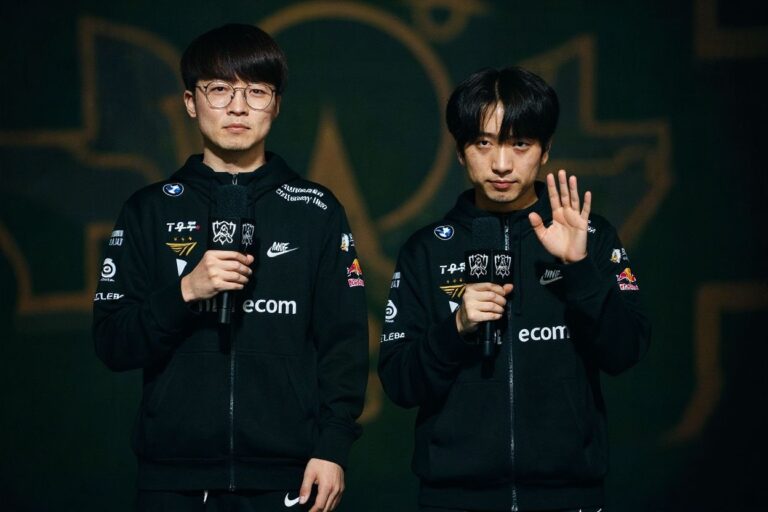
After four “League of Legends” (LoL) World Championship titles, 10 Korean titles, and several other awards, Lee Sang-Hyeok, better known as Faker, is the first inductee for Riot Games’s version of the Hall of Fame, the Hall of Legends.
Faker, for those who aren’t familiar, has been an icon in the esports industry throughout his 10-year gaming career.
He’s been called the Michael Jordan of esports. An American publication named him, superstars BTS, “Parasite” film director Bong Joon-Ho, and football player Son Heung-Min as “South Korea’s Elite 4”. A Chinese publication added figure skater Kim Yuna to the list, naming the group “The Big 5 Korean National Treasures”.
So, clearly, Faker and esports are a big deal.
 Esports may not involve physical exertion, but competitive gamers often deal with performance pressure and expectations, managing in-game performances, and coping with defeat.
Esports may not involve physical exertion, but competitive gamers often deal with performance pressure and expectations, managing in-game performances, and coping with defeat.
All this talk about esports, but what is it?
Esports, short for electronic sports, is a US$2 billion industry with over 540 million global audiences.
It’s an organised competitive spectator sport of online gaming where gamers compete in tournaments against each other for cash prizes.
Throughout their gaming careers, individuals and teams focus and work towards these international competitions and championships. Some of the biggest games include “League of Legends,” “Dota 2,” “Overwatch,” “Valorant,” and “Fortnite,” just to name a few.
These games draw in viewers by the millions.
The 2018 LoL World Championship finals saw more unique viewers tuned into the event online than the 2017 Super Bowl did. The 2023 LoL World Championship is currently the most-watched esports tournament, with viewership peaks at more than 6.4 million.
With so many eyes on screens, there is a million-dollar question: Is esports even a real sport?
What classifies an activity as a sport?
The Oxford Dictionary defines sport as “an activity involving physical exertion and skill in which an individual or a team competes against another or others for entertainment”. This means that chess, bridge (a trick-taking card game), Formula 1, and tug-of-war are all sports.
Functionally, esports is almost identical to a traditional sport as its top-level athletes compete for the top spots in their sport or game.
But the arguments against esports being labelled a sport are fair. This Reddit user commented, “In my opinion, the ‘e’ in ‘esport’ is like the ‘e’ in ‘email’. While email isn’t actually mail, it’s similar enough to have a variant of the world. Same thing with esport.”
However, there’s been a change in the conversation and perceptions of esports over the years.
A Quora user commented, “Esports don’t require sprinting or tackling, but the mental agility needed is astounding. Executing split-second tactical decisions under pressure? Coordinating seamless teamwork during chaotic virtual battles? That’s the athleticism of the highest calibre, just applied in a different sphere.”
In June 2024, the International Olympic Committee proposed the creation of “Olympic Esports Games” to the 142nd IOC Session. While the results of that proposal aren’t concrete, many are keeping an eye on what’s to come for the future of esports.
Beyond the actual gaming, it’s a booming market too; Fortune Business Insight predicts that the global esports market will grow from US$2 billion in 2024 to US$9 billion by 2032.
So now is the time to make the leap and start your esports career, just maybe not in the way you think.
 Anyone can join the esports industry, even those who do not have a degree related to it.
Anyone can join the esports industry, even those who do not have a degree related to it.
Here for a good time (hopefully), not a long time (unfortunately)
A career as an esports professional gamer is short-lived.
Washington Post found that esports stars have shorter careers than NFL players. For “Overwatch 2”, the average retirement age is 23, whereas for “Call of Duty”, the average age is 26.
However, gaming companies are currently hiring for positions in the industry.
Riot Games, one of the industry-leading companies and developers of LoL and Valorant, has opened more than a hundred positions. The careers range from data analyst to broadcast engineer, community manager to financial accountant. Most job scopes require applicants to have experience or familiarity with gaming, tech, or e-commerce.
Blizzard Entertainment, home to “Warcraft,“ “Diablo,“ and “Overwatch“, is hiring too. “Fortnite“ and “Unreal Engine“ developer Epic Games has jobs up for grabs, and so does Japanese multinational video game titan Nintendo.
And where there is demand, there is supply.
Universities around the world are starting to provide programmes in esports or ones that are related to it.
If you’re looking to learn about the business side of the gaming industry, including community engagement, event and operations management, and strategic marketing, Full Sail University’s Bachelor of Science in Game Business & Esports is the programme for you.
The University of Utah offers a Bachelor of Science in Games for students looking to create and publish various types of video games. Osan University in South Korea started offering degrees in esports, focusing on several aspects of the industry, including marketing, broadcasting, and operations.
While universities are starting to create esport-related programmes, you don’t need a degree in esport to have a gaming career or work in the industry.
6 gaming careers for non-gamers who want to enter the industry
1. Concept artist (Games)
Also known as Lead artist or 2D artist.
A concept artist’s primary responsibility is determining the best process for creating a game’s style and look based on the client’s needs. Other job scopes include designing sketches, storyboards, and outlines.
Concept artists are skilled at art, drawing, creativity, communication, and using art software.
If you’re interested in exploring gaming careers as a concept artist, you could consider degrees in art, animation, graphic design, computer-aided design, or a similar field.
You can pursue your studies at these universities:
- BA in Fine Art at the University of the Arts London
- BFA in Illustration at The New School
- Bachelor of Design in Animation and Game Design at Curtin University
2. Animator
Also known as computer graphics (CG) animator, games animator, or 3D animator.
Animators bring objects made by 2D and 3D artists to life. They produce sequences that create the illusion of movement for characters, adding personality, emotion, and realism to the game.
Because of that, animators need to be skilled at drawing, character movement, game engines, and software such as C++, Unity, Maya, and Motion Builder during their gaming careers.
Studying game design, animation, computer graphics, or a similar field can help you become an animator in the gaming industry.
You can pursue your studies at these universities:
- BS in Game Design at DePaul University
- BSc in Computer Graphics, Vision and Games at Aberystwyth University
- BA in Creative Media at the City University of Hong Kong
3. Music composer
Also known as games composer or games music composer.
Music composers create a game’s mood and excitement. Their primary role is to produce and record the game’s theme tunes. The music they create adds depth and colour to the game and expresses certain emotions and events for gamers to experience.
Game music composers are skilled at sound editing software (Logic Pro, Adobe Audition, Protools, Sound Forge, Cool Edit Pro), game engines, music, and sound engineering.
If you are interested in helping create the atmosphere in a game, you can look into degrees in composition, audio and music engineering, audio design, or a similar field.
You can pursue your studies at these universities:
- Bachelor of Music in Game and Interactive Media Scoring at Berklee College of Music
- Bachelor of Music and Sound Design at the University of Technology Sydney
- BSc in Sound Engineering and Audio Production at Confetti Institute of Creative Technologies
4. 3D modelling artist
Also known as character artist, games artist, vehicle artist, or 3D artist.
3D modelling artists bring 3D creations — characters, weapons, vehicles, trees, rocks, cats, and so on — to life. The process often starts with a 2D drawing from concept artists, and then the 3D modelling artists sprinkle their magic.
3D modelling artists are skilled in 3D modelling, sculpting and painting software, game engines, art, and Adobe Photoshop.
To kickstart your gaming career, you need degrees in graphic design, motion graphics, animation, fine arts, or a similar field.
You can pursue your studies at these universities:
- BA in Motion Graphics at Nottingham Trent University
- BFA in Animation at the University of Technology, Arts and Design
- BFA in Graphic Design at Oregon State University
5. UX/UI (user experience/user interface) designers
Also known as UX/UI artist or visual designer.
UX/UI designers participate in the design process for the development of websites, mobile apps, and other digital products. UX designers ensure that the games are easy to navigate through, while UI designers are concerned with the user interface, meaning they create the look and feel of the menus.
UX/UI designers are skilled in analytical thinking, design, empathy, and visual scripting tools.
Degrees in human-computer interaction, interaction design, information architecture, or a similar field can help kick-start your gaming career as a UX/UI designer.
You can pursue your studies at these universities:
- Bachelor of Design in Digital Future at Ontario College of Art & Design University
- Bachelor of Design Innovation at the Victoria University of Wellington
- BS in Information at the University of Michigan
6. Game testers
Also known as quality assurance (QA) games tester, QA technician, or QA tester.
Game testers test specific aspects of a game, write detailed reports, and then re-test the game to ensure its improvement. They also look for bugs, spelling mistakes, and glitches. Sadly, they don’t get paid just to play games all day — that would be the dream for a gaming career.
Game testers are skilled at following instructions to help game developers create flawless games. They need to have an acute attention to detail, plenty of patience for repeated playthroughs, and good communication skills to convey the problems found in the game efficiently.
If you’re interested in becoming a game tester, you could consider degrees in software development, game design, or a similar field.
You can pursue your studies at these universities:
- BFA in Interactive Design and Game Development at Savannah College of Art & Design
- BSc in Game Design at the University of Liverpool
- BS in Software Engineering at Amsterdam Tech










